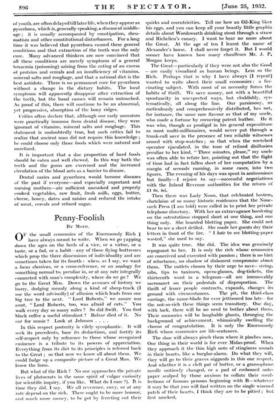Penny-Foolish
RY MOTH.
CIF the small economies of the Enormously Rich I have always meant to write. When we go yapping down the ages on the heels of a vice, or a virtue, or a taste, or a fad, or a habit—any of those flying buttresses which prop the three dimensions of individuality and are sometimes taken for its fourths: when, as I say, we want a locus class icus, or a cross-reference, or an analogy for something nonnal to, peculiar in, or at any rate integrally connected with man's complexity, where do we go ? We go to the Great Men. Down the avenues of history we hurry, dodging meanly along a kind of sheep-track (I use the word advisedly) of allusion which leads from one big tree to the next. "Lord Roberts," we assure our aunt, "Lord Roberts, too, was afraid of eats." You walk every day so many miles ? So did Swift. You find black coffee a useful stimulant ? BRIZSC died of it. No car for music? Look at Johnson . . . .
In this respect posterity is vilely sycophantic. It will seek its precedents, base its deductions, and fortify its self-respect only by reference to those whose recognized eminence is a tribute to its powers of appreciation. Everything from its diet to its principles is referred back to the Crest; so that now we know all about them. We could fudge up a composite picture of a Great Man. We know the form.
But what of the Rich ? No one approaches the private lives of plutocrats in the same spirit of vulgar curiosity (or scientific inquiry, if you like.. What do [care ?). ft is time they did, I say. We all reverence, envy, or at any rate depend on the rich. There Ought to be more honour, and much more money, to be got by ferreting out their quirks and eccentricities. Tell me bow an Oil-King likes his eggs, and you can keep all your beastly little graphic details about Wordsworth drinking stout through a straw and Richelieu's canary. I want to hear no more about the Great. At the age of ten I learnt the name of Alexander's horse. I shall never forget it. But I would sooner have known how many chauffeurs Mr. J. P. Morgan keeps.
The Great—particularly if they were not also the Good —are easily visualized as human beings.. Leas so the Rich. Perhaps that is why I have always (I repeat) wanted to write about their small economies : a fas-- cinating subject. With most of us necessity forms the habits of thrift. We save money, not with a beautiful spontaneity in unexpected ways, but cloddishly, sys- tematically, all along the line. Our parsimony, so meticulously and comprehensively distributed, has not, for instance, the same rare flavour as that of my uncle, who made a fortune by cornering patent leather. He it was who, though as prodigal in his general expenditure as most multi-millionaires, would never put through a trunk-call save in the presence of two reliable witnesses armed with stop-watches ; so that when the wretched operator ejaculated, in the tone of refined disillusion peculiar to her kind, 'Three minutes, please," my uncle was often able to refute her, pointing out that the flight of time had in fact fallen short of her computation by a margin of seconds- running, in some eases; into two figures. The evening of his days was spent in acrimonious but finally—I rejoice to say—successful negotiations with the Inland Revenue authorities for the return of IA Os. 8d.
Then there was Lady Noun, that celebrated hostess, chatelaine of so many historic residences that the None- such Press (I am told) were called in to print her private telephone directory. With her an extravagance bordering on the ostentatious stopped short at one thing, and one thing only. She hoarded blotting paper. She could not bear to see a sheet defiled. She made her guests dry their letters in front of the fire. " I hate to see blotting-paper wasted," she used to say.
It was quite true- She did. The idea was genuinely repugnant to her. It is only the rich whose economies are conceived and executed with passion ; there is no hint of reluctance, no shadow of dishonest compromise about them. The outlets chosen by their urge to save—string, nibs, tips to taximcn, opera-glasses, dog-tickets, the thirteenth word in a telegram—all are irremovably sacrosanct on their pedestals of disproportion. The thrift of lesser people contracts, expands, changes its
ground with circumstances. The pit, the third-class carriage, the razor-blade for ever jettisoned too late—for the not-so-rich these things seem transitory. One day, with luck, there will be no need to bother about them. Their memories will be laughable ghosts, thronging the background of achievement, whimsically swelling the chorus of congratulation: It is only the Enormously Rich whose economies are life-sentences.
The shoe will always pinch them where it pinches now. One thing in their world is for ever- Midas-proof. When they approach it the thin high note of stinginess sounds in their hearts, like a burglar-alarm: Do what they will, they will go to their graves niggards in this one respect. And whether it is a cleft pat of butter, or a gramophone needle untimely changed, or a pad of embossed note- paper scalped by those anxious to collate their recol- lections of famous- persons -beginning with B----whatever it may be that you will find written on the single wizened patch of their hearts, I think they are to be pitied ; but first mocked,


































 Previous page
Previous page